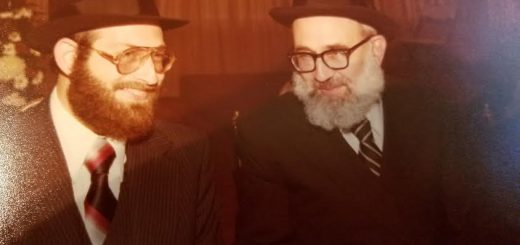Grisha’s Choice

A few days ago, I posted a piece about Grigory Perelman, the Jewish mathematician who solved the Poincaré conjecture. One of our readers, a Russian-Jewish mathematician of considerable attainment himself, sent me a private communication, essentially saying that Americans could not possibly understand what Soviet Jews had to go through. His reconstruction of the probable cause for Perelman’s decision turns the story from one about intellectual integrity to one about Jewish heartache and pride. As all of us engage the new reality of mounting world-wide anti-Semitism, his letter is a poignant reminder of how Jews lived while locked in a vise-grip of hatred. At the request of the author, I had to delete many details, since there could still be nasty consequences to friends and relatives living in Russia. The Iron Curtain may have fallen, but Russian hatred of Jews is alive and well.
I am afraid that Grisha’s words in the end of the article — why he gave up the medal — can be understood only by a well-informed mathematician who lived in Russia and knows something about the West as well.
Many people here know about anti-Semitism in Soviet mathematics but relatively few people know how discoveries — at all levels – of Jews, and then of other non-ethnic-Russian mathematicians too – were stolen by “big men.” For example, a famous problem was settled by a young Jewish undergraduate student who submitted his paper to a Soviet journal. His paper was kept there for two years — exactly the time his referee needed — with full knowledge of the editors — to publish these results under his own name. The real author was denied any access to mathematics — graduate schools didn’t take Jews at that time. Finally he found an obscure job — I think at a telephone station in a small Ukrainian town.
Yet too many people knew and talked about that. So, two years later, they published the paper of the young Jew who “also” obtained these results. The thief got all possible recognition, prestigious foreign prizes — and was allowed to travel abroad to collect them. Many people know his name because of “his” brilliant result. As far as I know, the young man was unable to obtain a graduate mathematical education. His famous paper remained his only publication. Only 16 years later, well after the USSR ceased to exist, he published three more papers, all of them in US journals. Yet in his best years he had to do something else, not mathematics.
There were plenty of examples like that. For example, many Jews told me how their results submitted to a well known academic center in Siberia were published by mathematicians from that center. Things became so bad that, in at least one branch of mathematics, almost all papers submitted to the Soviet journals were sent to one Corresponding Member of the Soviet Academy of Sciences in Moscow. If the author was not someone well known and the paper was very good, it was given
(and, as I heard later, sold) to people who wanted to get academic degrees but lacked any results for their dissertations. The standard method was — they would submit the manuscript as their own and, after it was accepted or published, the real author would get a rejection because his results had already been known.Virtually every Soviet mathematician who was “in” can tell you of many cases like that — but everyone kept silent. Besides, it is difficult to PROVE such things.
It was very difficult to make copies of manuscripts in the USSR as all photocopiers were under KGB control. You had to submit your paper in triplicate (one for the censors — if it were accepted, one for the journal, and the third one — I don’t remember for what — maybe for the referee. Besides that, you had to submit your paper with an official Act of Expertise that had to say that your paper had no value, no elements of scientific novelty, didn’t disclose any state secrets, could not be used to harm the interests of the USSR — and hence deserved to appear in an open — non-classified — journal. The “experts” kept a copy in their archives — so you needed FOUR copies — plus the fifth one for yourself. If you stroke your typewriter real hard, you could make the original and four carbon copies, with the the last one (yours) almost illegible.
I was surprised when one young mathematician sent me such a copy of his submitted paper — he just wanted to know my opinion. 2-3 years later I asked him whether his paper was published. He told me it appeared under a different name in another journal, after which he got a rejection. I went to the library, found the journal, and ascertained that this paper was submitted there by another person about a year after I got that manuscript. There is a former Soviet-Jewish mathematician who comes from a famous Chassidic family. When he was a “boy,” I invited him to give a talk at my seminar. Later, when they decided to turn his dissertation down at the Soviet governmental committee, I was able to persuade a secret Russian referee for the committee to write a very good report — the referee wanted to return the dissertation without any report because he was an honest man and knew what they expected of him, although he told me the dissertation was very good.
After the seminar I invited the boy to my house, we had a supper prepared by my wife and talked. He told me he was afraid to submit anything to that Siberian center because they had already stolen a couple of his good results. Later I learned of other such cases — stolen papers published by group-theorists whose names were and are well known.
Now, I am explaining all that to show you the background from which Perelman came. By the way, at the LOMI (the standard acronym of the Leningrad branch of the Steklov institute where Perelman had some sort of a job) they didn’t hire Jews. That is, they had a few and tried to hire no one else.
A friend of mine was arguably the best specialist in his field in the USSR – and something like an assistant prof. at that institute. They would never promote him. Finally, his boss told him that he’d do everything possible to promote him to the
associate position — even though such ultimate bravery might cost him his own position. By that time that man and I — normally in Leningrad I stayed in his apartment, where there was a room for me — talked about possible emigration. So this mathematician abruptly quit his job! — as Perelman recently did. To make the ends meet he tutored. Everyone decided he was ready to emigrate (this was the usual sign — I don’t have time to explain why). Now, the man quit his job because … he was afraid that his non-Jewish boss would succeed and promote him! (Later he would try to leave the USSR for good. He became a refusenik for a few years and was finally allowed to move. He was instantly snapped by one of the best US universities as a full professor.) He feared that the head of his department would pay dearly for that promotion. So his was a purely ethical dilemma. Another man wanted to do something good and noble. But, unbeknownst to himself, he would get in trouble because of that. So the mathematician decided to quit his job at the LOMI to make his promotion moot.“Everyone” knows that. I think, this was exactly the thing Perelman called “ugly” in the New Yorker article. He would get the Fields medal and would be touted by the LOMI (as it has been renamed now) as their crown achievement, as the athematician they produced etc. — although that place didn’t like Jews. He would sit in presidiums, travel to come to many international conventions — being a star, walking in a tuxedo (and not in his cherished corduroy jacket 🙂 ). He’ll have to shake the front paws of the people he does not respect and smile at them. He knows that all other stars invited with him know what he knows — this “ugly side” — and the New Yorker authors only hint at that in the article. But they are “pets” — and he — willy-nilly — would have to be a pet too, a member of the establishment. So Grisha made his choice. Very very few people in his shoes would make the same choice.
I don’t believe he will stop doing mathematics. It is physically impossible for him. Can a very talented composer stop composing music? I am afraid that such a composer would write it in his head only — depriving all of us the privilege of listening to it. I hope that Grisha Perelman would not make THIS choice.




I feel like I’m a little slow, but I know it’s because this is really Kafkaesque. Why does Perelman feel he has to be in Russia after everything the Russian system (Soviet and post-Soviet) has done to him? There must be a better place in the world for him, but it seems he has turned the abuse inward. It is very sad. Someone should help him work it out for himself so that he can get out, never come back, work in some academic or reasearch institute in a polyglot environment and just do his thing. He needs to draw a line and move on. He needs to get free from his life story. He needs life coaching to do it.
Thanks for passing this letter along. Very interesting…I guess that’s also why Perelman posted his proof on the Internet instead of submitting it to a journal.
To quote the original New Yorker article:
I suspect he’s staying in Russia for the sake of his mother, who may have all sorts of her own reasons for not moving. I also suspect that if Perelman ever did want to emigrate, he could get a professorship at any math department on the planet.
It is hard to believe the story when no person is being named. No dates are given. No incidents described wit sufficient detail to enable independent verification.